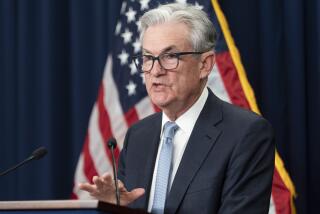Bond Prices
- Share via
QWhy do bonds fall in value when market interest rates rise?
--Shirley Lux, Lakeland, Fla.
AImagine a bond that pays 5% interest a year, has 10 years left until maturity and has a face value of $1,000 (the amount the bond holder will get back at maturity).
This bond pays $50 a year in interest. But say market interest rates have risen since this bond was issued and you can buy new 10-year bonds that pay 10%, or $100 per year per $1,000 face value.
No one will pay $1,000 for a bond that pays 5% if they can buy new bonds paying 10%. So the market price of the 5% bond must fall. In effect, buyers demand a discount on the bond to compensate for the lower yield it pays.
The size of that discount depends on various market and technical factors, but the basic idea is that the 5% interest, combined with the expected capital gain when the discounted bond eventually returns its full $1,000 face value at maturity, should approximate what new bonds pay.
More to Read
Inside the business of entertainment
The Wide Shot brings you news, analysis and insights on everything from streaming wars to production — and what it all means for the future.
You may occasionally receive promotional content from the Los Angeles Times.










